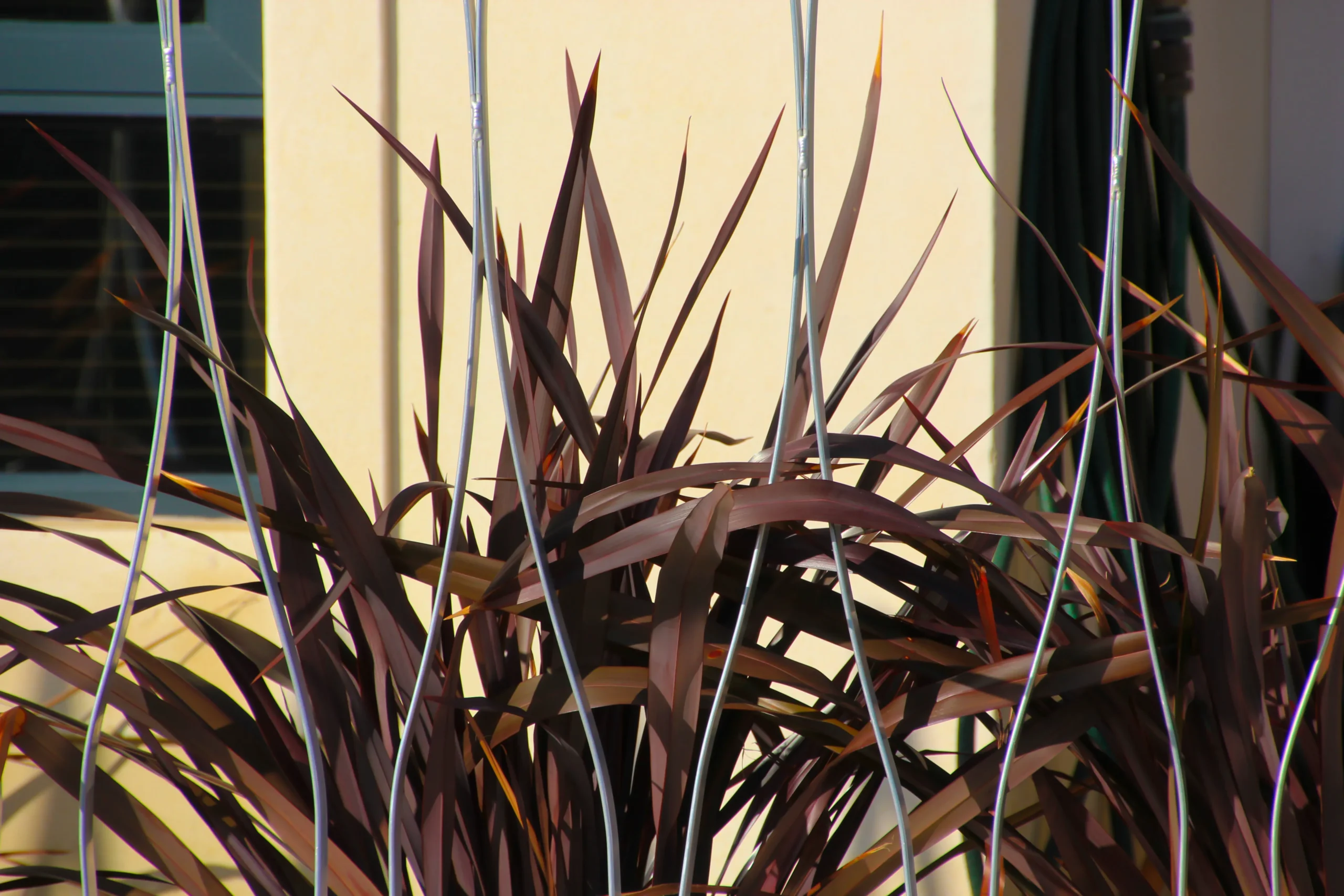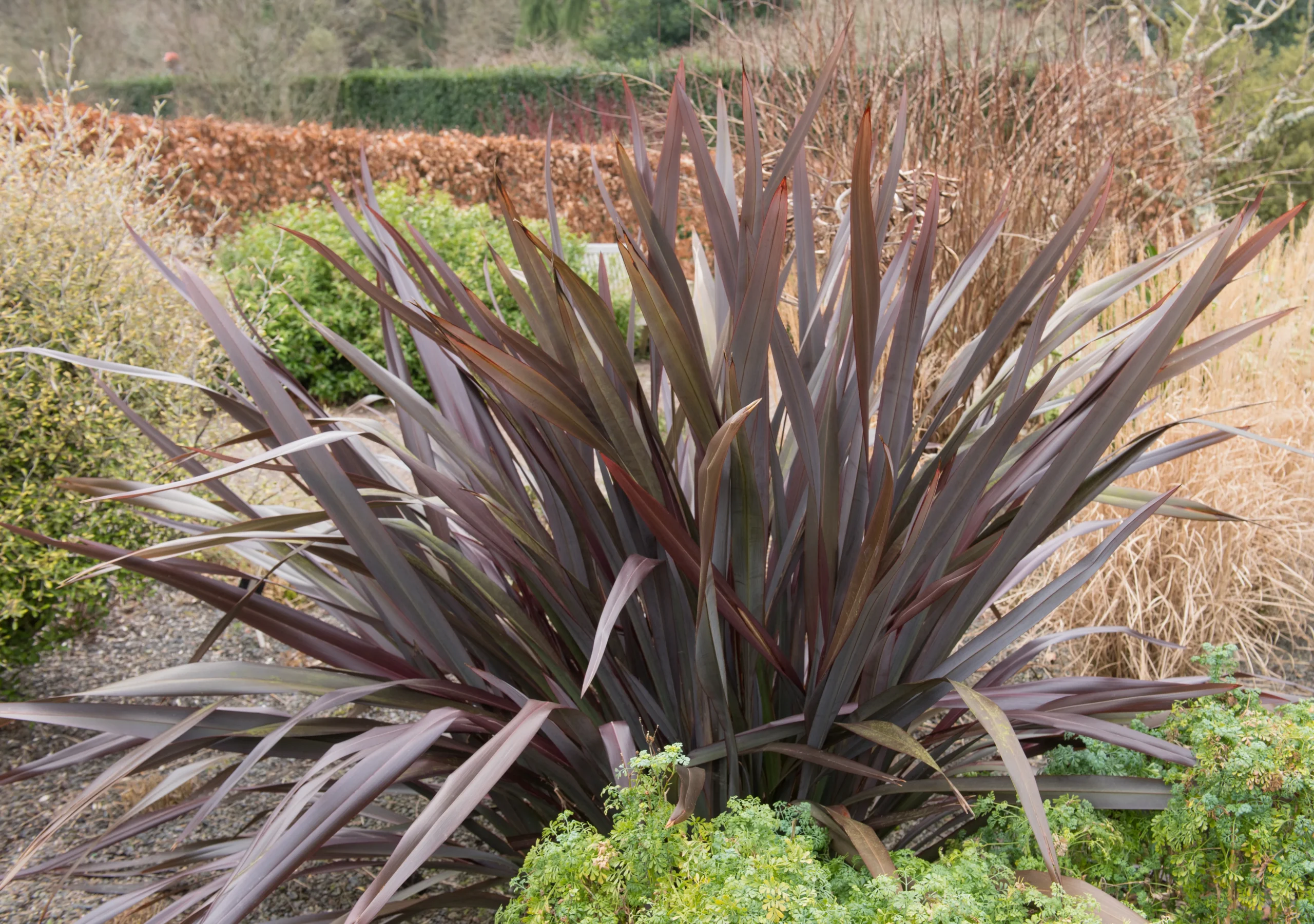Family: Phormium
Type: Annual

Black Adder Phormium, also known as New Zealand Flax, captivates with its dramatic, dark burgundy to almost black foliage. This striking plant stands out for its sword-shaped leaves that add a bold, architectural element to any garden or landscape. Ideal for creating contrast and visual interest, Black Adder Phormium is a versatile perennial that can elevate the design of modern and traditional gardens alike.
Thriving in full sun to partial shade, this robust plant is remarkably drought-tolerant once established, making it a low-maintenance option for gardeners seeking maximum impact with minimal effort. Its tolerance for a range of soil types and conditions, including coastal environments, further adds to its gardening appeal. Black Adder Phormium can reach heights of up to 3-4 feet, offering a compact yet striking presence.
Whether used as a focal point, in mass plantings, or as part of mixed borders, Black Adder Phormium brings year-round color and texture to the garden. Its unique foliage pairs beautifully with brightly colored flowers and other ornamental grasses, creating dynamic and visually engaging compositions. Beyond its aesthetic value, it’s also known for its resilience against pests and diseases, ensuring a garden space that remains vibrant and healthy.
Hardiness Zone: 8a-11b
Deer Resistant: Yes
Pet Friendly: Yes
Moisture Preference: Average to moist
Sun Needs: Full sun to partial shade
Growth Rate: Medium
Average Height (feet): 4
Average Spread (feet): 3
Average Life Span (years): 10
Form: Arching
Foliage Color: Red
Foliage Shape: Sword-like
Incorporating Black Adder Phormium into your garden design instantly adds depth and sophistication. Plant it as a specimen to draw the eye and anchor garden beds, or use it to create dramatic borders that define garden spaces with its striking foliage. Its architectural quality enhances garden structures like paths, ponds, and patios, providing a backdrop that emphasizes the beauty of surrounding plants.
This plant is especially effective in contemporary garden designs, where its bold texture and color contrast sharply with minimalist aesthetics. Grouping several Black Adder Phormiums together can create a dramatic, monochromatic display, or mixing them with lighter, feathery plants can produce a stunning visual balance.
For gardens with limited space, Black Adder Phormium is an excellent candidate for container gardening. Placing it in large, decorative pots can add a touch of elegance to balconies, decks, or terraces, allowing even urban gardeners to enjoy its striking appearance. The versatility of this plant opens up endless possibilities for creative garden design.

Black Adder Phormium is a natural fit for modern gardens, where its clean lines and dramatic coloration complement sleek, contemporary designs.
In Mediterranean gardens, it provides a stunning contrast to the typically bright and airy plant palette, adding depth and visual interest.
Its tolerance for wind and salty conditions makes Black Adder Phormium an ideal choice for coastal gardens, where it contributes structure and color against the backdrop of the sea.
Pair Black Adder Phormium with silver or blue-hued plants, such as Lavender or Blue Fescue, to create a striking color contrast that highlights the beauty of both.
Use it to add vertical interest to rock gardens or dry riverbed designs, where its tall, upright foliage mimics natural reeds and grasses beside water features.
Incorporate Black Adder Phormium into wildlife-friendly gardens. Its dense foliage provides shelter for birds and insects, while its low maintenance requirements ensure a garden that thrives with minimal human intervention.
Select our pre-made garden layouts to create a landscape that’s uniquely yours. Simple, smart, and customizable!
In spring, Black Adder Phormium's vibrant foliage begins to intensify in color, standing out brightly against the fresh greens of the season.
During the summer, it maintains its rich, dark tones, offering a cooling visual effect in the garden's palette and providing a lush backdrop for summer blooms.
As fall arrives, Black Adder Phormium continues to hold its color, adding interest and warmth to the garden as other plants begin to fade.
In winter, its evergreen foliage remains striking, offering a stark contrast to the barren landscape and ensuring year-round interest in the garden.
Select a location that receives full sun to partial shade for your Black Adder Phormium. It thrives in areas where it can soak up the sun for at least half the day.
Bright, indirect sunlight or partial shade best suits Black Adder Phormium, enabling its foliage to maintain its vibrant color without getting scorched.
This plant prefers well-draining soil and is fairly adaptable to different soil types, though it does best in slightly acidic to neutral pH levels.
Give each plant about 3 to 5 feet of space on all sides to accommodate its spread and ensure optimal airflow, reducing the risk of fungal diseases.
The ideal time to plant Black Adder Phormium is in the spring or early fall, allowing it to establish itself before the extremes of summer heat or winter cold.
Plant at the same depth as the container it came in, ensuring the root ball is level with the surrounding soil. Water thoroughly after planting to settle the soil around the roots.
Initially, keep the soil evenly moist but not soggy. Once established, Black Adder Phormium is drought-tolerant, requiring less frequent watering.
Apply a slow-release fertilizer in the spring to support healthy growth throughout the season. Avoid over-fertilizing to prevent growth at the expense of color.
Trim away any damaged or dead foliage in the spring to keep the plant looking tidy and encourage new growth. Minimal pruning is needed otherwise.
Start the season with pruning and fertilizing to encourage vigorous growth. Ensure adequate watering as the temperatures begin to rise.
Monitor soil moisture and water as needed, especially in prolonged dry periods. Black Adder Phormium can handle summer heat well once established.
Reduce watering and prepare the plant for cooler temperatures. In colder regions, consider adding mulch for root protection.
In zones where winter is mild, Black Adder Phormium requires little care during these months. In colder areas, protect the plant from frost.
Yes, Black Adder Phormium can thrive in pots, making it suitable for patios and balconies. Ensure the container has adequate drainage.
In colder climates, mulch around the base and, if possible, move potted plants to a sheltered location to protect them from frost.
Black Adder Phormium is not known to be toxic to pets, but it’s always best to prevent pets from ingesting plants as a precaution.
Sign up below to get exclusive deals, discounts, and new plant collections—delivered straight to your inbox! Plus, stay inspired with the latest gardening tips, landscaping trends, and DIY garden ideas. Start growing with us today!
A big thank you for subscribing to the PBN Design newsletter.
We're thrilled to have you join our community. Get ready for exciting updates, insightful content, and more delivered straight to your inbox.
Stay tuned!
Go backA big thank you for subscribing to the PBN Design newsletter.
We're thrilled to have you join our community. Get ready for exciting updates, insightful content, and more delivered straight to your inbox.
Stay tuned!
Go back